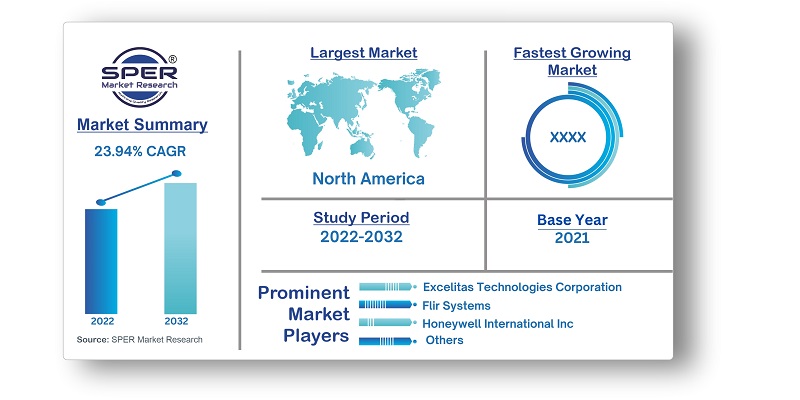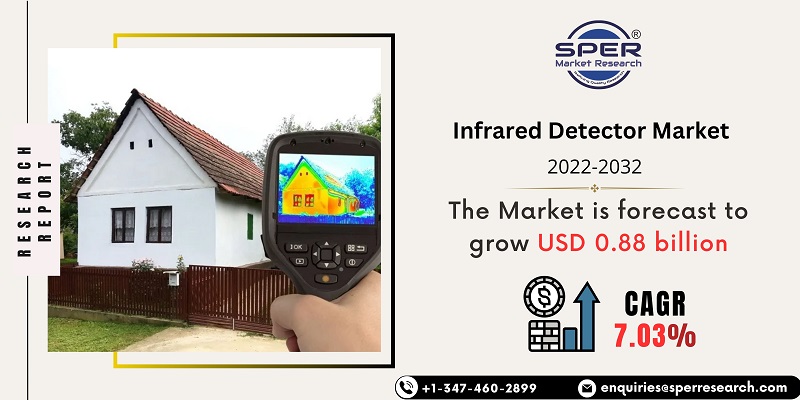
Infrared Detector Market Growth, Share, Size, Trends, Revenue and Future Competition 2032
Infrared Detector Market Size- By Type, By Spectral Range, By Application, By Technology, By Wavelength, By Vertical - Regional Outlook, Competitive Strategies and Segment Forecast to 2032
| Published: Feb-2023 | Report ID: SEMI2306 | Pages: 1 - 237 | Formats*: |
| Category : Semiconductor and Electronics | |||
- Increasing need for security and surveillance: Because of its capacity to detect thermal signatures, infrared detectors are frequently employed in security and surveillance systems, making them vital for recognizing intruders or strange actions in low-light or night-time circumstances. Infrared detectors are in high demand due to the increasing need for increased security measures in residential, business, and public places.
- Rising demands for thermal imaging cameras: The popularity of thermal imaging cameras for diverse applications such as predictive maintenance, building inspections, firefighting, and medical diagnostics has boosted the demand for high-performance infrared detectors.


| Report Metric | Details |
| Market size available for years | 2019-2032 |
| Base year considered | 2021 |
| Forecast period | 2022-2032 |
| Segments covered | By Type, By Spectral Range, By Application, By Technology, By Wavelength, By Vertical |
| Regions covered | Asia-Pacific, Europe, Middle East and Africa, North America, Latin America |
| Companies Covered | Excelitas Technologies Corporation, Flir Systems, Hamamatsu Photonics K. K, Honeywell International Inc., Murata Manufacturing Co. Ltd, Nippon Avionics Co. Ltd, Omron Corporation, Raytheon Company, Sofradir, Texas Instruments Inc. |
- Research and Development Institutions
- Manufacturers and Suppliers
- System Integrators and OEMs
- Government Agencies and Defence
- Regulatory and Standardization Bodies
| By Type: |
|
| By Spectral Range: |
|
| By Application: |
|
| By Technology: |
|
| By Wavelength: |
|
- Global Infrared Detector Market Size (FY’2022-FY’2032)
- Description of Global Infrared Detector Market
- Segmentation of Global Infrared Detector Market By Type (Thermal Detector, Photo Detector)
- Segmentation of Global Infrared Detector Market By Spectral Range (Long-wave IR, Medium-wave IR, Short-wave-IR)
- Segmentation of Global Infrared Detector Market By Application (Aerospace & Defence, Automotive ,Consumer Electronics ,Industrial ,Medical Security)
- Segmentation of Global Infrared Detector Market By Technology (Indium Gallium Arsenide, Mercury Cadmium Telluride, Microbolometer, Pyroelectric, Thermopile, Others)
- Segmentation of Global Infrared Detector Market By Wavelength (LWIR, MWIR, NIR AND SWIR)
- Segmentation of Global Infrared Detector Market By Vertical (Industrial, Non-Industrial)
- Statistical Snap of Global Infrared Detector Market
- Expansion Analysis of Global Infrared Detector Market
- Problems and Obstacles in Global Infrared Detector Market
- Competitive Landscape in the Global Infrared Detector Market
- Impact of COVID-19 and Demonetization on Global Infrared Detector Market
- Details on Current Investment in Global Infrared Detector Market
- Competitive Analysis of Global Infrared Detector Market
- Prominent Players in the Global Infrared Detector Market
- SWOT Analysis of Global Infrared Detector Market
- Global Infrared Detector Market Future Outlook and Projections (FY’2022-FY’2032)
- Recommendations from Analyst
1.1. Scope of the report1.2. Market segment analysis
2.1 Research data source
2.1.1 Secondary data2.1.2 Primary data2.1.3 SPER’s internal database2.1.4 Premium insight from KOL’s
2.2 Market size estimation
2.2.1 Top-down and Bottom-up approach
2.3 Data triangulation
4.1. Driver, Restraint, Opportunity and Challenges analysis
4.1.1 Drivers4.1.2 Restraints4.1.3 Opportunities4.1.4 Challenges
4.2. COVID-19 Impacts of the Global Infrared Detector Market
5.1. SWOT analysis
5.1.1 Strengths5.1.2 Weaknesses5.1.3 Opportunities5.1.4 Threats
5.2. PESTEL analysis
5.2.1 Political landscape5.2.2 Economic landscape5.2.3 Social landscape5.2.4 Technological landscape5.2.5 Environmental landscape5.2.6 Legal landscape
5.3. PORTER’S five forces analysis
5.3.1 Bargaining power of suppliers5.3.2 Bargaining power of Buyers5.3.3 Threat of Substitute5.3.4 Threat of new entrant5.3.5 Competitive rivalry
5.4. Heat map analysis
6.1 Global Infrared Detector Manufacturing Base Distribution, Sales Area, Product Type6.2 Mergers & Acquisitions, Partnerships, Product Launch, and Collaboration in Global Infrared Detector Market
7.1 Thermal Detector7.2 Photo Detector
8.1 Long-wave IR8.2 Medium-wave IR8.3 Short-wave IR
9.1 Aerospace & Defence9.2 Automotive9.3 Consumer Electronics9.4 Industrial9.5 Medical9.6 Security
10.1 Indium Gallium Arsenide10.2 Mercury Cadmium Telluride10.3 Microbolometer10.4 Pyroelectric10.5 Thermopile10.6 Others
11.1 LWIR11.2 MWIR11.3 NIR AND SWIR
12.1 Industrial12.2 Non-Industrial
13.1 Global Infrared Detector Market Size and Market Share by Region (2019-2025)13.2 Global Infrared Detector Market Size and Market Share by Region (2026-2032)13.3 Asia-Pacific
13.3.1 Australia13.3.2 China13.3.3 India13.3.4 Japan13.3.5 South Korea13.3.6 Rest of Asia-Pacific
13.4 Europe
13.4.1 France13.4.2 Germany13.4.3 Italy13.4.4 Spain13.4.5 United Kingdom13.4.6 Rest of Europe
13.5 Middle East and Africa
13.5.1 Kingdom of Saudi Arabia13.5.2 United Arab Emirates13.5.3 Rest of Middle East & Africa
13.6 North America
13.6.1 Canada13.6.2 Mexico13.6.3 United States
13.7 Latin America
13.7.1 Argentina13.7.2 Brazil13.7.3 Rest of Latin America
14.1 Excelitas Technologies Corporation
14.1.1 Company details14.1.2 Financial outlook14.1.3 Product summary14.1.4 Recent developments
14.2 Flir Systems
14.2.1 Company details14.2.2 Financial outlook14.2.3 Product summary14.2.4 Recent developments
14.3 Hamamatsu Photonics K.K
14.3.1 Company details14.3.2 Financial outlook14.3.3 Product summary14.3.4 Recent developments
14.4 Honeywell International Inc.
14.4.1 Company details14.4.2 Financial outlook14.4.3 Product summary14.4.4 Recent developments
14.5 Murata Manufacturing Co.Ltd
14.5.1 Company details14.5.2 Financial outlook14.5.3 Product summary14.5.4 Recent developments
14.6 Nippon Avionics Co.Ltd
14.6.1 Company details14.6.2 Financial outlook14.6.3 Product summary14.6.4 Recent developments
14.7 Omron Corporation
14.7.1 Company details14.7.2 Financial outlook14.7.3 Product summary14.7.4 Recent developments
14.8 Raytheon Company
14.8.1 Company details14.8.2 Financial outlook14.8.3 Product summary14.8.4 Recent developments
14.9 Sofradir
14.9.1 Company details14.9.2 Financial outlook14.9.3 Product summary14.9.4 Recent developments
14.10 Texas Instruments Inc
14.10.1 Company details14.10.2 Financial outlook14.10.3 Product summary14.10.4 Recent developments
SPER Market Research’s methodology uses great emphasis on primary research to ensure that the market intelligence insights are up to date, reliable and accurate. Primary interviews are done with players involved in each phase of a supply chain to analyze the market forecasting. The secondary research method is used to help you fully understand how the future markets and the spending patterns look likes.
The report is based on in-depth qualitative and quantitative analysis of the Product Market. The quantitative analysis involves the application of various projection and sampling techniques. The qualitative analysis involves primary interviews, surveys, and vendor briefings. The data gathered as a result of these processes are validated through experts opinion. Our research methodology entails an ideal mixture of primary and secondary initiatives.



Frequently Asked Questions About This Report
PLACE AN ORDER
Year End Discount
Sample Report
Pre-Purchase Inquiry
NEED CUSTOMIZATION?
Request CustomizationCALL OR EMAIL US
100% Secure Payment






Related Reports
Our Global Clients
Our data-driven insights have influenced the strategy of 200+ reputed companies across the globe.






















